Unsung Hero (PG)

Starring: Daisy Betts
April 2024
Warning! This is NOT a movie review. This is a critique of the film. Intended to initiate a dialogue, the following analysis explores various aspects of the film and may contain spoilers. For concerns over objectionable content, please first refer to one of the many parental movie guide websites. Ratings are based on a four star system. Happy reading!
David Smallbone (Joel Smallbone), an Australian music promoter, has had some success in bringing contemporary Christian bands from America to the land Down Under in the late 80s. Despite sound advice to the contrary, David turns down a “lesser act,” DeGarmo & Key, and signs a major deal to bring over emerging superstar Amy Grant for an extensive concert tour.
Then the nation suffers an economic downturn, resulting in Grant performing for crowds of hundreds rather than thousands. Since David’s name appears on the contract, he ends up losing his job and foreclosing on his beautiful home.
In an act of desperation, David takes a job in America and moves his wife, Helen (Daisy Betts), and six kids (with one in the oven) to Nashville, TN. Showing up to work on the first day, David learns that his position was given to someone else. Since his work visa prohibits him from getting another job, David resorts to doing landscaping work for cash with his older kids just to afford their unfurnished house. When David solicits work at a nearby mansion, guess who opens the door? Yep, you guessed it…Eddie DeGarmo!
Right off the bat, the movie gives us a poignant lesson in the dangers of pride. David considered it beneath him to bring DeGarmo’s band over to his country. Now he’s in DeGarmo’s country scrubbing his toilet bowl. How the mighty have fallen.
Pride rears its ugly head when David is shamed by generous neighbors and fellow churchgoers. He pushes them away right when his family needs them most, when child #7 arrives. David’s inability to find a job and provide for his family sends him into a state of debilitating depression.
In yet another act of pride, David shuns the advice of his loving father, James (Terry O’Quinn). During a phone conversation, David hangs up on his dad; an act that comes back to haunt him just days later when James unexpectedly dies.
Of course, this film isn’t about debased David, his long-suffering wife or his ever-encouraging dad, it’s about the Smallbone children—three of whom would grow up to become Grammy Award-winning performers.
They say kids are resilient, and this movie certainly proves that aphorism true. Without beds, batteries for toy robots or even much to eat (Ramen again?), the kids found ways to stay busy helping the family and somehow managed to have fun despite their limited means and humble circumstances. This spotlights the movie’s main theme, which is that the most important things in life are faith and family—an ethic exemplified by the Smallbone clan.
The most famous Smallbone is the eldest daughter, Rebecca St. James (Kirrilee Berger). Her younger brothers, Joel and Luke, are members of the group For King & Country. In an ironic feat of casting, Joel (who also co-wrote and co-directed the film) plays his father, who was about his age during the early 90s, when the movie is set.
There are many highlights in the film, including the two-hanky Christmas scene when neighbors show up with everything on the Smallbone’s wish list; furniture, washer and dryer, Christmas tree and presents.
The movie’s culminating moment comes when seventeen-year-old Rebecca auditions for DeGarmo, with her younger brothers singing background vocals (the tryout comes complete with edited home video footage projected onto a large screen by another of the Smallbone boys). Rebecca’s original song, “You Make Everything Beautiful,” has a lilting quality and a catchy, hum-all-day melody.
So, who’s the titular agency? Is it the unidentified benefactor who pays the Smallbone’s hospital bill after the birth of their youngest child? Or is it some unseen guiding hand that, through all their hardships, has been leading the Smallbone family to exactly where they need to be? Depends on what, or who, you believe. But there’s no mystery as to what the Smallbone family believes.
Unsung Hero is an inspirational, follow-your-dreams biopic that reminds us of the power of courage, kindness and perseverance.
And to honor God, country, family and all the other heroes in our lives.
Rating: 2 ½ out of 4
I Still Believe (PG)
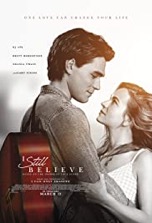
Starring: Britt Robertson
March 2020
Warning! This is NOT a movie review. This is a critique of the film. Intended to initiate a dialogue, the following analysis explores various aspects of the film and may contain spoilers. Views are my own and elaborate on comments that were originally tweeted in real time from the back row of a movie theater @BackRoweReviews. For concerns over objectionable content, please first refer to one of the many parental movie guide websites. Ratings are based on a four star system. Happy reading!
Based on the real-life experiences of singer Jeremy Camp, I Still Believe is a unique film in that it’s both heartbreaking and inspiring. That bittersweet dichotomy permeates every moment of this tragic love story, which also focuses on faith and family.
Jeremy Camp (K.J. Apa) and Melissa Henning (Britt Robertson) meet at a concert and it soon becomes apparent that their love is written in the stars. But the universe throws the young couple a curveball when Melissa is diagnosed with cancer.
To its credit, the story doesn’t degenerate into a melodrama when depicting its tragic events. There isn’t a false note during the film’s emotionally gut-wrenching passages, particularly those that take place in the hospital.
The film benefits from some superb acting. Though Apa and Robertson scintillate as the movie’s central couple, the supporting cast is equally impressive. Jeremy’s parents are portrayed by Gary Sinise and Shania Twain. One of Melissa’s sisters is played by Melissa Roxburgh, the star of TVs Manifest. In an ironic bit of casting, Cameron Arnett, who played a terminal patient in last year’s Overcomer, appears here as Melissa’s doctor.
The film is directed by the Erwin Brothers (Andrew and Jon), who also helmed last year’s surprise hit I Can Only Imagine; another biopic about the life of a musician, Bart Millard. In a refreshing gesture of paying it forward, Millard serves as one of this movie’s producers.
The Erwin’s have done an amazing job of making a modestly budgeted film feel like a prestige studio drama. Aerial shots, like the ones at Camp’s beachside concert, are impressive and surely weren’t cheap to film. The movie also boasts a diverse soundtrack and an affecting score by John Debney (The Passion of the Christ).
A two-hanky tearjerker, this film will have added significance for anyone who’s lost someone. It’s an eternally hopeful love story filled with music and more than its fair share of genuine, human moments.
In the end, I Still Believe is a moving true story of true love. It’s anchored by superb performances and features a story unafraid to ask some of the big questions about life…and death. And what it means to really believe.
Rating: 3 out of 4
Green Book (PG-13)
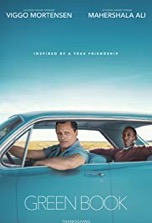
Starring: Viggo Mortensen
November 2018
Warning! This is NOT a movie review. This is a critique of the film. Intended to initiate a dialogue, the following analysis explores various aspects of the film and may contain spoilers. Views are my own and elaborate on comments that were originally tweeted in real time from the back row of a movie theater @BackRoweReviews. For concerns over objectionable content, please first refer to one of the many parental movie guide websites. Ratings are based on a four star system. Happy reading!
Inspired by a true account, Green Book tells the story of an Italian driver (Viggo Mortensen) and a black piano player (Mahershala Ali), who embark on a concert tour to the Deep South in the 60s. Book is a poignant snapshot of the attitudes and mores of the period in focus. It’s also a road trip/buddy film that deals with racism in powerful, yet unexpected ways. The image of a white man driving around a black man makes many people stop and gawk; this role reversal stands out as one of the movie’s more ironic elements. Book has some magical moments, like: the chicken bone toss, lucky rock, confession in the rain and Christmas dinner scenes. The movie’s production is sensational, especially its period appropriate coifs, costumes and cars. Book also boasts tremendous acting from its two top-tier stars. Mortensen (virtually unidentifiable from his role as Aragorn in The Lord of the Rings films) and Ali (Moonlight) deliver extraordinary performances that should garner Oscar attention. Though Book is a tad idealistic, it contains a powerful central theme: namely, that reconciliation can win out over racism when people from different cultures choose to see things from the other’s perspective. Equal parts humorous and bittersweet, Book never sermonizes as it spotlights this less enlightened period of U.S. history. As a kicker, Book features one of the most heartwarming resolutions in recent film history.
Rating: 3 1/2 out of 4
Hearts Beat Loud (PG-13)

Starring: Nick Offerman
June 2018
Warning! This is NOT a movie review. This is a critique of the film. Intended to initiate a dialogue, the following analysis explores various aspects of the film and may contain spoilers. Views are my own and elaborate on comments that were originally tweeted in real time from the back row of a movie theater @BackRoweReviews. For concerns over objectionable content, please first refer to one of the many parental movie guide websites. Ratings are based on a four star system. Happy reading!
Frank Fisher (Nick Offerman), a self-professed “purveyor of pressed vinyl,” is going through a rough patch. Not only is Frank faced with closing his record store and starting a new career, his daughter, Sam (Kiersey Clemons), will soon be heading off to college on the other side of the country. Frank’s bartender buddy, Dave (Ted Danson at his most witty and wise), tells him life is about adapting to setbacks, something Frank knows all too well since his wife was killed by a car while riding her bike. Back in the day, Frank and his wife were part of a reasonably successful band. Even though the music gene has been passed on to Sam, she’s more interested in becoming a doctor. A family tradition that Sam has outgrown but Frank insists they keep observing is the “Jam Sesh,” where Frank plays guitar and Sam plays keyboards and sings (Frank’s “Jam Sesh Dance” is one of the movie’s more amusing moments). One such session results in the titular song, which Frank uploads on Spotify. As fate would have it, the song ends up on a new artist playlist, which catches fire and generates interest from a music label. At this point, most films would veer toward the sentimental and conclude with Sam putting her education on hold, Frank getting a second chance at making it big in the music biz and the duo releasing several records and racking up a handful of #1 billboard hits. Fortunately, director Brett Haley (The Hero) pulls back the reins on that schmaltz stallion and resolves the film in a realistic manner. Music is central to the film, and the songs (written by Keegan DeWitt) are deeply affecting. The musical/vocal performances by Offerman and Clemons really sell the songs; the actors also sell their characters and their relationship as father and daughter. The supporting players are wonderful as well: Blythe Danner plays Frank’s frequently incarcerated mother, Toni Collette is Frank’s landlady and “friend,” and Sasha Lane is delightful as Sam’s supportive girlfriend. In the end, Hearts is so much more than a follow your dreams, father/daughter music movie. It’s a lamentation for the heartfelt and finely crafted music of a bygone era. Not only have we lost record stores to the likes of Amazon and eBay, but we’ve also lost the knowledge of the albums and artists themselves—anecdotes and trivia now retained only by diehard fans and a handful of aging radio DJs who were groupies when the artists were in their prime. Sure, you can Google CCR and get plenty of facts about the group, but Siri isn’t going to reveal fascinating stories, deep cut knowledge and firsthand accounts of such artists like the Frank Fisher’s of the world can. Another challenge to the artistry of the past is that, due to the availability and affordability of home studio equipment, anyone can make a record now. Is that a good thing or a bad thing? Time will tell. The only thing we can do is adapt to the times…and follow the beat of our heart.
Rating: 3 out of 4 stars
Coco (PG)
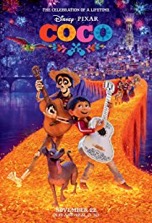
Starring: Anthony Gonzalez
November 2017
What follows is the full-length review based on comments that were originally tweeted in Real-time from the back row of a movie theater @BackRoweReviews. Though efforts were made to tease rather than ruin this movie’s memorable lines and moments, some spoilers may exist in the following evaluation. For concerns over objectionable content, please first refer to one of the many parental movie guide websites. Ratings are based on a four star system. Happy reading!
For their latest animated adventure, Disney/Pixar has selected main characters of a different kind. Instead of focusing on toys, cars, fish, robots or insects, they’ve returned to the world of people. However, not all of these people are alive. No, the animation studios haven’t gone all zombie on us (although, how cool would that be?). Focusing on the Mexican people and their Day of the Dead holiday (Nov. 1&2 annually), the studios have given us a glimpse of what life is like in the Land of the Dead. The story focuses on Miguel (Anthony Gonzalez), a young boy who wants to be an entertainer like his idol, Ernesto de la Cruz (Benjamin Bratt). Performing at the local talent show can help launch Miguel’s career, but first, he must borrow a guitar. But not just any guitar…the signature guitar that Ernesto played during his heyday, before the bell tolled and he met an early demise. Since he must ask for permission to play Ernesto’s guitar, Miguel embarks on a journey to the other side. Once Miguel has crossed the petal covered bridge that connects both worlds, he sets out to find Ernesto among the teeming masses of the macabre metropolis. As he navigates the Land of the Dead, Miguel encounters Hector (Gael Garcia Bernal), a lanky, fun-loving skeleton man who serves as both humorous sidekick and voice of reason for Miguel. Despite his seemingly silly persona, Hector holds a secret that literally busts open the story like a smashed piñata. Coco’s explosion of color rivals the visual vibrancy of the Finding films. Though certainly a marvel in its own right, Coco’s prismatic palette pales in comparison to its brilliant plot, which is chock-full of colorful characters and meaningful moments. This is the studios’ first attempt at spotlighting the customs and values of a minority culture. Director Lee Unkrich and his team of writers wisely avoided populating the story with clichéd characters and worn-out stereotypes. This is a deep dive into the hearts and minds of a people devoted to artistic expression, exuberant celebrations, fervent spirituality and, above all, the love of family. We’re treated to some traditional and modern Latin music including “Remember Me,” a top-tier, tear-jerker that should be a shoo-in for Oscar’s Best Song. Despite the fact that most of the movie works like magic, Coco has a fatal flaw—it borrows too heavily from other sources. The film mirrors Back to the Future in several key areas. Like Marty McFly (Michael J. Fox), Miguel wants to be a famous guitar player. Another point of comparison is that Marty and Miguel both travel through time (actually, the Land of the Dead probably exists outside of time, but close enough). Also, Marty and Miguel frequently reference family photos to learn clues about their family history and identity…and very existence. Ironically, the most obvious instance of plot theft in the story involves another Pixar movie. The trajectory of this film’s villain is so similar to that of Up’s Muntz, the only word that comes to mind is derivative, which I never thought I’d use to describe a Pixar movie. The film has problems with its premise too. For instance, is it really necessary to travel to the world beyond just to borrow a guitar? Admittedly, these are minor grievances in a movie that thoroughly entertains. The film subtly tempers its follow-your-dreams theme with a cautionary tale regarding the dangers of hero worship. Unkrich does a remarkable job of making morbid subject matter relatable and even, at times, humorous (e.g. the nude skeleton portrait scene). In the final analysis, Coco is rich in culture and character, sight and sound. It’s also a heartwarming tale of multigenerational connection between a young boy and his grandparents. Coco delivers an emotional wallop at the end, just to remain consistent with Pixar’s MO of leaving its audience in tears. But this time they’re tears of joy. Over a family reunion. Over fulfilled dreams. And over a young boy returning home…to the Land of the Living.
La La Land (PG-13)
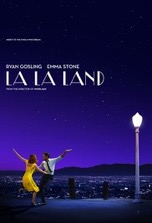
Starring: Ryan Gosling
December 2016
What follows is the full-length review based on comments that were originally tweeted in Real-time from the back row of a movie theater @BackRoweReviews. Though efforts were made to tease rather than ruin this movie’s memorable lines and moments, some spoilers may exist in the following evaluation. For concerns over objectionable content, please first refer to one of the many parental movie guide websites. Ratings are based on a four star system. Happy reading!
During the opening musical number in La La Land, appropriately staged on a L.A. freeway, I thought: “Dear God, what have I gotten myself into?” Based on that intro, I thought the remainder of the movie would be comprised of similarly elaborate musical numbers performed at regular intervals throughout the film. Much to my relief, I was wrong. The movie quickly transforms into an engaging romance/drama with only the occasional song and dance number interspersed throughout the narrative. What ensues is a follow-your-dreams tale where Sebastian (Ryan Gosling), a struggling piano player, wants to open his own jazz club and Mia (Emma Stone), a frustrated barista, wants to become a famous actress. Writer/director Damien Chazelle cannily delays the romance between Sebastian and Mia by arranging a series of anti-meet cutes, which should be a sign to the couple that their love affair is destined to be ill-fated. Casablanca (1942) is referenced a few times in the film and holds obvious significance for the star-crossed couple, particularly in how both films end. LLL seeks to tap into the brilliance of such masterpieces as Casablanca for its dramatic passages and Singin’ in the Rain (1952) for its musical routines. The film is brimming with classical Hollywood nods like the old film posters that adorn the walls of Mia’s bedroom and the Sebastian and Mia’s screening of Rebel Without a Cause (1955) at the Rialto Theater. As such, LLL is a reimagining of the Hollywood musical, a largely retired genre. Ironically, relying so heavily on Golden Age Hollywood themes and iconography has proven to be a double-edged sword for the film. On the one hand, the heavy quotation of vintage films has established the film’s look, mood and atmosphere as well as produced feelings of nostalgia in viewers enamored with such films. On the flip side, it could be argued that the film relies too heavily on early Hollywood tropes and that such an effort was done intentionally, to play on viewer’s emotions and to pander to those in the industry, particularly Academy members. Either way, LLL fails to achieve its goal since it doesn’t adhere to classical modes of storytelling. Indeed, the movie is a mélange of genres (comedy/drama/musical/romance) and is, perhaps, too ambitious for attempting to combine so many disparate story elements. One of those aspects is the jazz appreciation subplot. Whereas keeping the arts alive is an important endeavor, the obvious validation of jazz as an essential, vibrant art form is foisted on the audience and such advocacy is just one more objective the film tries to accomplish. Though many of the film’s romance scenes feel trite, Chazelle’s concluding “the life that would have been” parallel action device is brilliantly executed and infuses the film with an unexpectedly bittersweet resolution. In the end, LLL’s story is the only thing that holds it back from becoming an instant classic. The film’s directing, acting, production values, locations, cinematography and music (especially Justin Hurwitz’ “City of Stars,” which has a wistful “Moon River” quality) are all off the charts. Gosling and Stone’s (in their third movie collaboration) screen chemistry is so searing it nearly makes the film melt, something that actually happens during Sebastian and Mia’s screening of Rebel. There’s far more that works here than doesn’t, and at the end of the day, the film’s unique vision has broadened the appeal and potential for the modern musical. LLL seems to be a strong contender to win Best Picture. It just depends on what Academy voters are in the mood for this year: depressing drama (Hell or High Water, Manchester by the Sea, Moonlight), historical biopic (Hacksaw Ridge, Hidden Figures), inspiring true story (Lion), space invasion flick (Arrival), converted stage drama (Fences), or this film. We’ll find out soon enough.
Love & Mercy (PG-13)
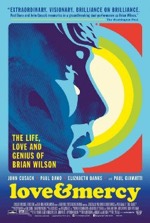
Starring: John Cusack
June 2015
This review was originally tweeted in Real-time from the back row of a movie theater and appears @BackRoweReviews. Though efforts were made to tease rather than ruin this movie’s memorable lines and moments, some spoilers may exist in the following evaluation. The original tweets appear in black, while follow-up comments appear in red. For concerns over objectionable content, please first refer to one of the many parental movie guide websites. All ratings are based on a four star system. Happy reading!

Paul Dano also plays the younger Wilson.
“Well the master lock feature works.” #SellingPoint
Elizabeth Banks is charming and compassionate throughout the film, but this meet-cute really sets the tone for what’s to come.
“Lonely. Scared. Frightened.” Most people write their number on the back of a business card.
Or a matchbook. Those three words are a cry for help and, fortunately for Wilson, Banks perceives his unspoken plea. I also love the fact that Wilson’s star power is completely lost on her. She’s attracted to the real person not the celebrity. Refreshing!
“We can’t let them get ahead of us.” Musical #ArmsRace with #TheBeatles.
The period in question was before my time, so I had no idea that such a competition existed between these two groups. It makes sense, since they were popular around the same time, but they hailed from different countries and had radically different musical styles.
“If you repeat a mistake every four bars, it’s no longer a mistake.” #Improvisation
This is a really fun scene and demonstrates Wilson’s genius. He definitely had an ear for complex chord structures and unusual sounds.
“He scared me into making great records.” The rough road to greatness.
This traumatic back story really humanizes Wilson and garners a tremendous amount of sympathy from the audience.
“Do you think we can get a horse in here?” Ha!
Fitting, since the album was called “Pet Sounds.”
“Help me help Brian.” #ControlFreak
Dr. Landy is a conniving, manipulative twit. Paul Giamatti plays the loathsome psychiatrist to perfection.
Hang on to your ego.
Actually, letting go of it is probably the better course of action.
A chorus of plate scrapes. Deafening and annoying.
This scene gives the audience an insider’s understanding of how sounds tortured Wilson. An extreme OCD.
Something’s wrong with the recording studio. #BadVibrations
Another indication of Wilson’s mad process.
“Could you at least drive me home?” Funny.
Final analysis: a fitting, touching tribute to a true musical genius.
And, most poignantly, how such genius often comes with a price. Remember van Gogh.
Rating: 3 out of 4. Dano and Cusack deliver tremendous performances as Wilson. Good vibrations, great film.
In some ways, this film reminds me of Julie & Julia (2009), a biopic based on the life of renowned chef Julia Child (Meryl Streep) and a young woman (Amy Adams) who decides to make all of the recipes in Child’s cookbook in one year. Though vastly different thematically, both films are decades-spanning biographical pieces that sustain their parallel narratives with riveting drama and superb performances. Whereas Julie featured two different people, Love features one person played by two different actors: Paul Dano as 60s Wilson and John Cusack as 80s Wilson. The most significant comparison is that the earlier (chronologically) stories in both films are far more compelling than the later ones. Streep is thoroughly mesmerizing as the French chef, but Adams, despite her disarming charm in playing a struggling chef who blogs about her culinary experiences in a Soho flat, just can’t elevate the ordinary story that comprises her half of the film. Unfortunately, that same pattern holds true here as the story of how Wilson created some of the Beach Boys’ greatest hits is far more fascinating than Wilson’s deterioration under the mismanagement of a shady psychiatrist. Dano is dynamic as young Wilson, while Cusack struggles to gain emotional footing as the adult Wilson in arguably the more difficult role. And then there’s the matter of appearances: while Dano looks a little like a twenty-something Wilson, Cusack looks nothing like a middle-aged Wilson. Since both Cusack’s appearance and performance fail to capture the essence of Wilson, one wonders why the actor was selected to play the superstar singer to begin with…and was real life Wilson consulted on the casting choice? The only thing that salvages the 80s storyline is the supporting players, especially Paul Giamatti and Elizabeth Banks. Giamatti plays one of the most despicable antagonists to have crawled out of a dark corner of the silver screen in quite some time. When he swears out Banks at the car dealership you literally want to throw something at the screen. As for Banks, she exudes uncommon compassion for the emotionally troubled musician and singlehandedly makes the entire adult Wilson section work. But enough about the Wilson’s later life; all of the film’s fun and energy occurs in the earlier time period. The making of the music is simultaneously enthralling and thrilling and Wilson’s traumatic childhood and slow descent into mental instability are utterly captivating. Even though snippets of the Beach Boys catalog can be heard throughout the movie, I could’ve used a lot more of their music here, along with more concert vignettes. Despite the movie’s Jekyll and Hyde narrative (which makes for an emotionally uneven movie), this is still a worthwhile glimpse into Wilson’s world and the mad process that forged the many unforgettable tunes he’s churned out over the years. Maybe the next time we can have a film with a unified tone and a lead actor that actually looks the part. Wouldn’t it be nice?
Danny Collins (R)
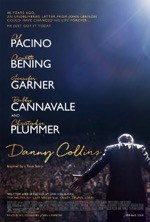
Starring: Al Pacino
April 2015
This review was originally tweeted in Real-time from the back row of a movie theater and appears @BackRoweReviews. Though efforts were made to tease rather than ruin this movie’s memorable lines and moments, some spoilers may exist in the following evaluation. The original tweets appear in black, while follow-up comments appear in red. For concerns over objectionable content, please first refer to one of the many parental movie guide websites. All ratings are based on a four star system. Happy reading!

Kinda based on a true story. Love the honesty.
Most “true story” films try to bamboozle us into thinking we’re watching an “actual account.” In many instances, what we’re really seeing is only the morsel of an authentic happening that’s been embellished into some egregiously sensationalized plot that bears little resemblance to the real event.
Opening concert: #MindiAbair on sax.
For those who’ve never seen Mindi in concert, you’re missing out…she’s an amazing performer. Mindi’s on a short list of female smooth jazz A-Listers (and when it comes to the saxophone, it’s her, Jessy J and Candy Dulfer).
Collins still has fans. “Three of them. Each one older than the last.”
Self-deprecating humor is one of Collins’ most endearing qualities, a trait that instantly wins over the audience.
“John Lennon wrote you a letter.” #BestBirthdayGiftEver
Unless it was delivered 30 years late.
“Busy Work” crawls out from under the bed. #Busted!
He definitely lives up to his name.
“Currently or in general?” Hilarious! #GoodPatter
This is the first scene with Pacino and Bening and the sparks start flying from the outset.
Danny’s attempts at matchmaking are humorous.
“You can’t buy redemption.”
You can’t buy love either. The Beatles made sure we knew that.
“I don’t know how I allowed it to go so long.” Touching scene.
At some point, it probably became easy just to put it off indefinitely.
#DinnerTease. Ha!
Bening sure knows how to play hard-to-get. Hats off to Warren Beatty.
Shattered picture frame, shattered relationships.
Symbolism? A definite possibility.
Danny loses his nerve and loses his dinner. #OneBadDecision
Good thing he doesn’t lose his lunch. That would just be too much.
“It’s a good thing when he calls you Tom.” Good father/son moment.
This is a genuinely moving scene and sets up a memorable final scene/shot.
Final analysis: a surprisingly moving washed up rocker tale with lots of heart and laughs.
Rating: 3 out of 4. Pacino is superb & has amazing chemistry with Bening. A heartwarming tale of redemption.
I have to admit, I was pleasantly surprised by this film. The trailer, which focuses mainly on the decades-old letter from Lennon, Collins’ life of excess and faux concert clips, didn’t do the movie justice. In some ways, this film reminds me of the similarly themed Music and Lyrics (2007). In that film, Hugh Grant plays a has-been 80s rock star holding on to the last vestiges of a music career by performing at smalltime clubs and state fairs. As the script would demand, Drew Barrymore enters his life and is a catalyst of change for Grant’s character, both personally and professionally. In this film, Collins befriends Bening who serves as confidant and muse to the derailed celebrity as he tries to put his life and career back on track. Fortunately, Collins doesn’t dedicate and play his new hit song for Bening during a live concert at movie’s end, as Grant does for Barrymore. This conscious effort to avoid schmaltz is one of the movie’s greatest assets, aside from its stellar performances. Pacino is predictably strong, and although this isn’t one of his finest performances, he’s thoroughly convincing not only in his portrayal of the larger-than-life singer, but also in his grungy, wrinkly and well-tanned appearance. Pacino is uber-charming in the film and plays the part of an old smoothie to the hilt. His screen chemistry with Bening is palpable and lends the film a fair amount of good-natured fun. The way Pacino infuses pathos into his character, in order to extract the optimal degree of sympathy from the audience, is absolutely brilliant. Indeed, we can’t help but cheer Collins on as he attempts to rectify past mistakes by inserting himself into the life of his adult son (Bobby Cannavale, in a pitch perfect performance)—whom he’s never met. The series of father/son vignettes, especially the movie’s final scene, serve to hoist the movie above the droves of middle-aged angst dramas that have graced the silver screen in recent years. Collins isn’t wildly original or overly inspirational, but it’s a highly effective, deeply affecting character piece that deftly sprinkles in some laughs and heartwarming moments amid the struggles of its title character; a fading celebrity, whose desperate attempts at remaining relevant and doing right by his family are strangely ennobling. All in all, Collins is a compelling slice-of-life tale and a friendly reminder that it’s never too late to make positive changes in our lives.
Begin Again (R)
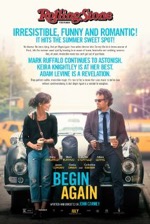
Starring: Keira Knightley
July 2014
This review was originally tweeted in Real-time from the back row of a movie theater and appears @BackRoweReviews. Though efforts were made to tease rather than ruin this movie’s memorable lines and moments, some spoilers may exist in the following evaluation. The original tweets appear in black, while follow-up comments appear in red. For concerns over objectionable content, please first refer to one of the many parental movie guide websites. All ratings are based on a four star system. Happy reading!

Vision, not gimmicks. The opposite of most entertainment these days.
Especially big budget blockbusters.
The imaginary arrangement that’s constructed around Knightley’s acoustic song is brilliant.
I envy people with such musical mutant powers.
The new song garners a slap from the mind reader.
Never underestimate the power of women’s intuition.
Record every song at a different location. A unique concept.
And a logistical nightmare. Probably the reason why no one’s ever done it before.
“Hold on” section with the kids is a nice moment.
Well worth the $5 per kid for their services.
Listening to Knightley’s playlist via a special splitter. Recreating a magical moment.
This musical montage is the highlight of the film. The sequence is the audio/visual equivalent of a warm embrace.
The kazoo solo is hilarious.
I used to play one as a kid, but I’m out of practice. I need to get my chops up.
A buck for a book is a risky proposition. An amusing coda.
I love it when we get additional story during the end credits and not just silly outtakes.
Final analysis: like Once, this is a song-centric film with strong character beats and fine performances.
The songs Knightley’s character sings have a Norah Jones or Colbie Caillat quality to them and should prove listenable, and perhaps even enjoyable, for most viewers.
Like the music it features, the film is a stripped-down drama that reminds us of what pure artistry really is.
Rating: 3 out of 4. A charming turn by Knightley & a new career watermark for Ruffalo. Plus some catchy tunes.
From director John Carney, who brought us the similarly themed and structured Once (2007), comes Begin Again, a dramatic and romantic movie that can’t really be classified as either. Nor can it be called a musical, despite the fact that it has just as many full songs as most musicals. Genre quandaries aside, what’s readily apparent is the movie’s easy manner and affable characters (and the picturesque location footage shot in NYC doesn’t hurt either). Besides its toe-tapping melodies, the film’s greatest asset is its deftness at avoiding standard rom-com clichés. For starters, there really isn’t a romance in the film since Knightley breaks up with her singer boyfriend, Dave (Adam Levine) and, thankfully, never hooks up with Ruffalo (eww!). The movie also does a good job of avoiding mawkish episodes: a scene near the end sets up the opportunity for an emotionally gratifying (and gratuitous) moment when Dave invites Knightley to the stage during a concert (the same exact scenario occurs when Hugh Grant coaxes Drew Barrymore to the stage in the 2007 film Music and Lyrics). Against our expectations, Knightley listens in the wing for a few minutes and then leaves. That’s just one example of how Carney (who serves as sole writer) diligently worked to keep his story free of contrivance. So then, no matter which genre Begin belongs to, file it in the feel-good music movie section, and those who stumble upon this indie winner will be completely satisfied.
Saving Mr. Banks (PG-13)
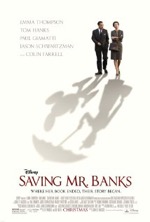
Starring: Emma Thompson
December 2013
This review was originally tweeted in Real-time from the back row of a movie theater and appears @BackRoweReviews. Though efforts were made to tease rather than ruin this movie’s memorable lines and moments, some spoilers may exist in the following evaluation. The original tweets appear in black, while follow-up comments appear in red. For concerns over objectionable content, please first refer to one of the many parental movie guide websites. All ratings are based on a four star system. Happy reading!

In case anyone cares for this brand of trivia, this is the second film Hanks has starred in with “saving” as the first word in the title.
Chlorine and sweat...an apt description of L.A.
Actually, chlorine is probably one of the city’s nicer smells.
I feel the same way about pears.
Eating sandpaper would have about the same effect.
An audience with Walt. The first/last name preferences are hilarious.
Some great dialog and performances by Hanks and Emma Thompson here.
No red in the picture. The demands keep coming.
The music goes up on the word down...ironic.
And ingenious.
Farrell’s speech is incredibly uncomfortable.
In fact, it’s squirm-in-your-seat awful.
“Get on the horse, Pamela.”
The penguin’s out of the bag...animation.
Walt’s story about delivering newspapers in the snow features some astounding acting.
Even by Hanks’ lofty standards.
Escorted to the premier by Mickey himself.
Be sure to sit through the end credits for an amusing extra.
Final analysis: an amazing production with stellar acting from a dazzling and diverse cast.
Especially Colin Farrell, Paul Giamatti and Jason Schwartzman…who can actually sing. His rendition of “Feed the Birds” is one of the film’s emotional high points.
A great deal of magic and heart here along with some bittersweet revelations of the past.
Rating: 3 1/2 out of 4 stars. Walt would be proud of this genuinely moving biopic.
When you think Disney, you think magic. Whether someone casting a spell in an animated feature or a woman pulling sundry items out of a bag in a movie like Mary Poppins (1964), the Disney classic which this movie is framed around, magic is a word very closely associated with the Mouse House and its numerous and diverse productions. If you’re doing a movie about Walt, it’d better be magical, and fortunately, there’s nothing to worry about here. Additionally, you’d better cast someone amazing to play Mr. Disney. Again, no problem since the namesake studio nabbed Hanks for the title role. For those who love classic Disney films, and Mary Poppins in particular, this movie will fill you with a rare form of elation that derives from deep admiration and fond memories. Some would define that special kind of feeling as…magic.
August Rush (PG)
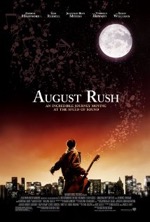
Starring: Freddie Highmore
November 2007
“Follow Your Heart…Follow the Music”
Ever seen a movie that had you convinced you were watching the greatest piece of cinema since Gone with the Wind until you left the theater and realized that your emotions had been manipulated by a mawkish screenplay and the cherubic face of an emerging acting prodigy? That’s the effect August Rush, director Kirsten Sheridan’s overly sentimental tear-jerker, had on me.
Evan (Freddie Highmore) was given up for adoption at birth. Now eleven, Evan runs away from an overbearing orphanage and embarks upon an incredible journey to find his parents. His parents—Lyla (Keri Russell), the cellist in a New York orchestra and Louis (Jonathan Rhys Meyers), the lead singer of a struggling rock band—met and conceived Evan on a one night stand…and then never saw each other again.
Evan possesses exceptional hearing abilities: he can pinpoint, filter, combine or adjust specific sounds to create musical compositions in his mind. He stands at a busy corner in NYC and, as if in a trance, conducts the cacophony of sounds that fill the air around him. Evan believes that following the music will one day lead him to his parents.
In Central Park, Evan encounters a talented young guitarist who takes him to a group of homeless musicians. In exchange for food and a place to sleep, the orphans pay tribute to the Wizard (Robin Williams), a surrogate father who exploits their talent for financial gain. It’s the Wizard who bestows the titular nickname upon the youth, but Evan is cautious of the capricious adult and soon breaks away from him and his musical misfits. Evan’s prodigious knowledge of music eventually leads him to The Julliard School of Music and ultimately back to his parents—ironically, Evan’s parents are drawn to his music, not the other way around. The movie climaxes with an emotional family reunion that, thankfully, doesn’t overstay its welcome.
A modern retelling of Oliver Twist, August Rush also borrows from many other “orphan seeks parents” films. However, the movie’s performances bail out the oft-sappy story: Russell, Rhys Meyers and Highmore are all superb, and Williams’ Fagin archetype is wonderfully nuanced and worthy of Oscar consideration.
Even though much of the movie seems far-fetched (an eleven-year-old at Julliard?) and oppressively heavy-handed, August Rush somehow manages to entertain and inspire. If the film’s ending feels a bit abrupt, know that it’s probably a blessing in disguise since a dénouement of any length would have tipped the scale from saccharine to maudlin. And no one would want to rush out and see that!
Rating: 3
Music and Lyrics (PG-13)
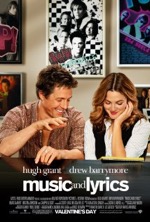
Starring: Hugh Grant
February 2007
“Romantic Melody with Dramatic Harmony”
Prosody. It’s a word music producers toss around that refers to the perfect marriage between lyrics and music. The characters in writer/director Marc Lawrence’s new film, Music and Lyrics, desperately search for prosody, both musically and relationally, and find a rare blend of artistry and intimacy over and under the piano.
Alex Fletcher (Hugh Grant), the former lead singer of the mullet-coifed 80’s group, Pop, has been commissioned to write a song for Cora (Haley Bennett), the newest sensation in pop music (think Britney but more seductive…if that’s possible). Cora gives Alex the hook line and tells him to deliver the song by Friday; Alex clears his schedule, gladly canceling a guest spot on the TV series, “Battle of the 80’s Has-beens.” Alex, who has no skill at writing lyrics, calls upon one of the industry’s finest lyricists to bail him out; but when it becomes painfully obvious that the partnership isn’t working, Alex turns to the substitute plant lady, Sophie (Drew Barrymore), who absentmindedly raps off some lines that perfectly fit the song while watering the petunias.
Alex and Sophie immediately hit it off and even though you can divine early on where the story is headed, credit Lawrence with making Alex and Sophie’s lovelorn journey a bumpy and unconventional one. In fact, the most enjoyable aspect of the movie is that the romantic interludes take a backseat to the compelling drama, which skillfully steers the plot. Case in point: there’s an excellent scene where Sophie tells Alex her back story over breakfast in a quaint bakery—it’s one of those magical moments which, unfortunately, are seldom given the chance to develop in most modern movies where special effects, not character development, rule the day.
As joined at the hip as the music and motion picture industries are, it’s refreshing to see a movie portray the music business honestly and unapologetically. Alex’ commentary at Cora’s pre-recording party—where he bursts Sophie’s idealistic bubble—is harsh but accurate, “In the end it’s all just business.” The thinly veiled caricature of Cora as a Britney/Christina/Shakira clone is perhaps a bit exaggerated but reveals the selfish tendencies and shallow propensities of many spoiled rotten pop stars who seem to make headlines (often negative) every day. Cora’s sensual, Indian-flavored songs were clearly written as tongue-in-cheek parodies of modern hits, but how similar are they to the vast majority of uninspired, cookie-cutter tunes that dominate today’s pop charts? It’s in these brilliantly insidious scenes where the screenplay is most instructive and effective. Unfortunately, the movie’s solid setup gives way to a standard happy ending that’s sure to make women sigh in ecstasy and men groan in agony.
Barrymore is in familiar territory here, and though she’s convincing, isn’t she getting just a bit typecast with these one-size-fits-all chick flicks? Could it be that there’s more in her than lighthearted dramedies? As for Grant, he simply steals the show with his charisma, charm and quick wit; his comedic timing is impeccable and his dramatic range is also impressive. The film is also augmented by its superb supporting talent: Brad Garrett takes on the role of Alex’ overprotective agent and Kristen Johnston plays Sophie’s sister, a lifelong Pop fan who absolutely worships Alex…especially when he’s in his tight black leather pants.
Music and Lyrics is a slightly better-than-average romantic comedy that strikes all the right notes with great performances and incisive dialogue. Whether or not the movie has achieved prosody, however, is a matter of opinion—after all, art, and especially music, is anything if not subjective.
Rating: 2 1/2
Happy Feet (PG)

Starring: Elijah Wood
November 2006
“Heavy-Handed Politics Leaves ‘Feet’ Flatfooted”
The last time I saw an animated movie this political was FernGully: The Last Rainforest (1992). An indoctrination session for the New Age movement, the movie extols the mystical energies that govern the “circle of life,” while vilifying the humans responsible for deforestation and upsetting nature’s delicate balance. On the face of it, Happy Feet is a seemingly innocent, completely innocuous animated film, whose only apparent pretension is that it comes too soon on the heels of 2005’s surprise hit documentary, March of the Penguins—but as we all know, appearances can be deceiving. For anyone who’s seen March of the Penguins, the opening chapter of Happy Feet will feel like a prolonged bought of déjà vu, complete with plagiarized narrations and scenes that look like they were lifted right out of the documentary.
Early on, the movie focuses on Mumble’s (Elijah Wood) desperate attempts to fit in with his peers; Mumble can tap-dance like Fred Astaire, but his singing resembles a blaring foghorn. One adult penguin, who looks down on the misfit youth, charges, “A penguin without a heart song is no penguin at all.” Excluded from many normal activities—much like that famous reindeer we’ve all sung about—Mumble often steals away to a nearby glacier and tap-dances by himself, away from disapproving eyes.
Somewhere along the way, the movie’s depiction of an outsider with abnormal development becomes a thinly veiled reference to homosexuality. The scene where this becomes painfully obvious is when Mumble teaches his peers how to tap-dance; the old guard vehemently opposes the new form of artistry, viewing it as an uprising, an aberration and a pagan display. When Mumble’s father implores his son to desist with his peculiar dancing, Mumble replies, “Don’t ask me to change, pa’, because I can’t.” With that, Mumble is banished from the penguin community.
A short time later, mumble is befriended by a quintet of diminutive, Latin-speaking penguins; awed by Mumble’s skillful dancing they welcome him into their group with open flippers. (As a pertinent aside, George Lucas was widely criticized for creating aliens with Asian accents in Star Wars: Episode I, but in Happy Feet, where ethnic speech stands out like Mumble’s blue eyes, no one, especially the liberal left—to whom the film heavily panders, has said a word about the obvious racial stereotyping.) Mumble and the Latin penguin entourage team up with Lovelace (Robin Williams), a kind of charismatic prophet who wears a plastic six-pack holder as a necklace.
As the ragtag group goes in search of “aliens”—the mysterious beings who gave Lovelace his necklace—they soon discover huge warehouses, docks, heavy equipment and colossal fishing boats. It’s at this point when humans are revealed as not only the aliens, but also as the villains of the movie; apparently humans have been stealing scores of fish from local waters and leaving the penguins with empty stomachs. Captured and imprisoned in an arctic exhibit, Mumble makes repeated attempts at communicating with his human captors, but his animal vocalizations fall on uncomprehending ears, “Why are you taking our fish? You’re kind of killing us out there!”
In order to keep from going crazy, Mumble learns to entertain spectators with his fancy footwork, which immediately draws the attention of the scientific community. Mumble is implanted with a tracking device and released from captivity: A film crew follows Mumble back to his home and captures footage of the penguins dancing in Mumble’s soulful style. Once assembled and released, the documentary creates a political and public outcry which leads to a moratorium being placed on fishing in the waters near Mumble’s glacier. The movie’s final shot tracks a penguin feather as it’s carried along by the wind in a gliding, meandering course, much like Robert Zemeckis’ free-flowing feather at the conclusion of Forrest Gump. Coincidence? I don’t think so!
Where Forrest Gump is existential, Happy Feet is environmental. In fact, the movie’s political slant is so transparent and so in-your-face, it’s almost nauseating. How cowardly of leftist Hollywood and environmentalist wackos to use an animated film to espouse, disseminate and otherwise foist their alarmist and fear-mongering doctrine upon audiences; offending many adults and unduly influencing the minds of future generations with a “green” theology.
The localized and oversimplified climax is utterly laughable…one dancing penguin can save the planet? One colony of dancing penguins can change international policy? I’m sure even older children can discern that they’re being sold a load of penguin droppings. And it’s really children who are loosing out the most here; for their sake, why can’t Hollywood check its politics at the door and let kids make up their own minds about where they stand on environmental issues…when they’re old enough to do so?
The real tragedy with Happy Feet is that, politics aside, the film is a visual marvel—the next evolutionary leap in CGI. The leopard seal chase is an exhilarating thrill ride of evasive maneuvers and narrow escapes and the killer whale sequences are absolutely breathtaking. Also, the movie’s vocal talents are stellar, though it seems as if every other character is voiced by Robin Williams, and that gets a tad tedious.
Happy Feet would’ve been so much better had it simply concentrated on being an animated kid’s film and not on being a stilted soapbox lecture on global correctness; the heavy-handed sermonizing severely detracts from what otherwise would have been a highly entertaining family film. So, as Mumble would say, I appeal to Hollywood’s better nature and officially request that they refrain from producing films, especially animated ones, which are nothing more than a political platform for some special interest group to use in propagating their misguided message to a mass audience. Just as there’s a separation of church and state, I propose a separation of politics and media. It probably would never work, but what the heck, we might just get objective news out of the deal.
Rating: 2
A Prairie Home Companion (PG-13)
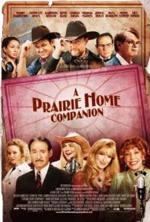
Starring: Lily Tomlin
June 2006
“Fitting Tribute to Keillor’s Off-Kilter Variety Show”
My first exposure to Garrison Keillor was in the early 80s when I watched his “A Prairie Home Companion” variety show every Saturday night on the Disney Channel. As a teen I thought GK (as Keillor is frequently referred to in the movie) was dry and boring, and yet I found myself frequently chuckling at the exploits of the down-home folk of fabled Lake Wobegon, MN, where “the women are strong, the men are good-looking and all the children are above average.”
Much like the actual show, Robert Altman’s A Prairie Home Companion is a bizarre effort. The movie centers on the program’s final show, which is broadcast over the radio and also performed in front of a live audience at the F. Scott Fitzgerald Theater in downtown St. Paul, MN. The film’s synergistic appeal is due largely to the variegated acts that take place on stage as well as the wonderful character moments behind stage and in the dressing rooms, all of which unfurl in real-time.
Take security man Guy Noir (Kevin Cline) for instance; all of his bits are fittingly shot in a film noir style as if he’s a kind of backstage detective. And then there are the Johnson sisters, Yolanda (Meryl Streep) and Rhonda (Lily Tomlin), who very nearly steal the show with their witty, fast-paced dialogue and amusing anecdotes. Yolanda’s daughter, Lola (Lindsay Lohan), has a few scenes, but doesn’t really factor into the story in any significant sense. Two singing cowboys, Dusty (Woody Harrelson) and Lefty (John C. Reilly) bring the house down with their naughty, bawdy, rip-roaring song, “Bad Jokes.” The Academy will officially put the T in travesty if “Bad Jokes” isn’t nominated for an Oscar—the song is the undisputed highlight of the film.
Tommy Lee Jones plays Axeman, the stiff suit sent to shut down the show after its final performance. Axeman is the closest thing the movie has to an antagonist, but other than providing occasional reminders about the show’s demise, the character doesn’t add much to the film. The most avant-garde element in the movie is the mysterious appearance of The Dangerous Woman, played by the lovely Virginia Madsen. Living up to her name, the blonde, white-gowned beauty is a major departure from the traditionally-drawn grim reaper with dark robe and scythe. The Dangerous Woman will claim someone’s life by the end of the night, a dreadful realization that creates ample tension while raising the question: Which character will become her unwitting victim?
Altman (Nashville) was a natural choice to helm this project; few directors can rival his attention to detail and character or approach his genius at taking everyday situations and presenting them as new, unique or quirky reflections of reality. A Prairie Home Companion, like many of Altman’s films, is a cinematic odd bird, but it’s also charming and inspiring in subtle ways. Due to the movie’s singular focus, limiting locale and real-time narrative, some spectators might get antsy toward the middle of the film. Though most of the vignettes are entertaining, the movie has an accumulative resonance, the full impact of which can only be experienced when reflecting on the film as a whole.
A Prairie Home Companion succeeds at honoring Keillor’s variety show while wistfully whisking us back to the mythical and magical days of early Americana; where neighbors were neighborly, deals were made with a handshake and families sat around a box to be entertained at night: Radio, not TV. Keillor’s eclectic program will forever be remembered as a conduit to an earlier, simpler time when folks lived, loved and died...somewhere out on the prairie.
Rating: 3
Joyeux Noel (PG-13)

Starring: Diane Kruger
March 2006
“Inspiring True Account of History’s Most Miraculous Truce”
Based on the incredible true story of the night peace and good will visited the trenches of French, Scottish and German soldiers during WWI, Joyeux Noel (aka Merry Christmas) chronicles the events surrounding history’s most astonishing ceasefire. On Christmas Eve, 1914, a German tenor started singing “Silent Night” and, upon recognizing the sacred Christmas carol, French and Scottish soldiers added their voices to the multicultural chorus from across the blood-soaked, corpse-littered battlefield. A miraculous event transpired when white flags ascended and soldiers from both sides descended upon the soiled plain; soon mortal enemies were communicating with each other (with only gestures in some cases), trading valuables and proudly showing off pictures of loved ones.
At the conclusion of a solemn Latin mass officiated by a Scottish priest, the three leaders had a summit and mutually agreed to lay down arms and sort out the fallen soldiers the next day. On Christmas day, one soldier ironically observed, “We’re burying the dead on the morning when Christ was born.” The day after Christmas presented a perplexing challenge as many of the soldiers on both sides struggled with resuming combat—men with whom they had played a friendly game of kickball the day before were now lined up in their crosshairs. Having seen the face of the enemy, many were reticent or flat-out refused to fight.
The irony of the story is how perspective can paint or taint our reality. For many of the soldiers, once the floodgates of friendship and mutual understanding had been flung aside, there could be no going back to the clear-cut, good guys/bad guys patriotism that prevailed in their home countries. The repercussions of treating the enemy with the tiniest shred of humanity were severe—most of the soldiers were sent home in disgrace, branded as traitors and replaced by fresh troops who were all too eager to raise the Sword of the Lord against the unholy hoard that was the German army. Though this makes for a bittersweet ending, Joyeux Noel, as a whole, is uplifting and inspirational, and the movie’s salience, in light of current events, is profound.
Despite the exemplary effort exhibited by the costuming, props and art departments, the movie suffers from slow pacing and static direction from writer/director Christian Carion, especially in the early goings. The only familiar face among the cast is Diane Krugger (National Treasure), who plays Anna Sorensen, an opera singer and wife of the German soldier who initiates “Silent Night.” The rest of the cast is comprised of foreign actors who adequately inhabit their roles with three standout performances: the singing German soldier, the French commander and the Scottish priest, who is the beneficiary of the best lines in the movie.
Joyeux Noel will undoubtedly find its place among the vast catalog of seasonal treasures, but the movie will be remembered more for its political commentary than for its Christmas-related story elements, which, though vitally important, comprise a very small part of the overall plot. They say music is the universal language, and if sworn enemies can find fellowship and common ground in the midst of the hellish realities of war, the adage is supremely accurate.
Rating: 3
Rent (PG-13)
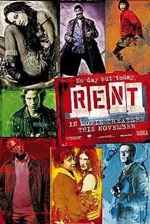
Starring: Taye Diggs
November 2005
“525,600 Reasons to Love This Multifaceted Musical”
Based on Puccini’s opera “La Boheme” and Jonathan Larson’s Pulitzer and Tony award-winning musical, Rent, which follows the lives of a group of friends in N.Y.C. over the course of one year, has finally made its way to the big screen. Many members of the original Broadway cast appear here, including show-stoppers Anthony Rapp (A Beautiful Mind) and Idina Menzel (“Wicked”).
The movie is a rock opera that focuses on the various aspects of struggle—the struggle to find love and acceptance, the struggle to overcome prejudice and loss and the struggle to make rent while trying to stay warm in a drafty East Villiage flat during the frigid winter months. Interspersed among the exceptional musical numbers are dramatic vignettes involving some very human, and therefore, very messed up characters. Take roommates Mark (Rapp) and Roger (Adam Pascal), for example. Mark is an aspiring movie director, whose ex-girlfriend, Maureen (Menzel), left him for another woman. Roger is numb from a recent loss and has a hard time opening up and letting anyone into his wounded heart. African American computer whiz, Tom Collins (Jesse L. Martin), faces the bitter reality that his cross-dressing lover, Angel (Wilson Jermaine Heredia), will soon die of A.I.D.S.
Though some of the subject matter is unabashedly adult in tone and content, Rent is an excellent window into the turbulent realities of inner-city life. Director, Chris Columbus, who’s known more for his family-friendly fare (Home Alone, Mrs. Doubtfire), stays true to the overall feel of the play, while skillfully translating it to the silver screen. Borrowing talent from the Broadway musical was a stroke of genius by the casting department—chemistry is hard to manufacture and the Rent ensemble is simply astounding. Besides the exceptional vocal performances, the movie also boasts brilliantly choreographed sequences, which really amp up the movie’s frequently somber storyline.
When all is said and done, the opening number “Seasons of Love,” by itself, is worth the price of admission. So, if you didn’t get a chance to see the movie in the theater, you owe it to yourself to go out and Rent it.
Rating: 3
Walk the Line (PG-13)
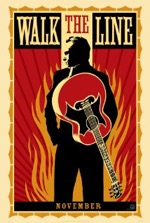
Starring: Joaquin Phoenix
November 2005
“Honest, Accurate Portrait of the Man in Black”
Following up last year’s smash-hit biopic, Ray, would be a daunting task for any movie, but Walk the Line, the tumultuous story of Johnny Cash’s passions and pitfalls, holds its own with remarkable performances and a screenplay that exudes authenticity thanks to its source material—Cash’s autobiography—and input from son and co-producer, John Carter Cash. Ray is referenced here because there are striking similarities between both movies, similarities that beg a closer examination.
Both Ray Charles and Johnny Cash were artists who not only rose to the highest pinnacle of the music industry, but also redefined their respective genres with charisma, innovation and sheer honesty born of tragedy. Both men battled infidelity on the road and both struggled with their addiction to drugs. Most strikingly, however, is that both men shared the same traumatic childhood event—through inaction, both Charles and Cash lost their brother to a senseless accident. It could be argued that the guilt and self-recrimination they experienced drove both men to drugs as a way of sublimating their emotional pain.
The events of Johnny Cash’s life certainly are powerful and dramatic, but the script is constrained by the need for veracity: what the story gains in authenticity, it looses in spontaneity, especially for those already familiar with the ups and downs of Cash’s career. In that regard, the movie would be easy to forget if not for the stellar performances delivered by the cast in general and the leads in specific. Reece Witherspoon is amazing as June Carter and Joaquin Phoenix is astounding as Cash—both portrayals are made all the more extraordinary by the fact that both actors did their own singing for the movie (like in Ray, musical interludes form the timeline and structure of the story and are enjoyable and memorable excursions from the film’s dramatic episodes). Witherspoon’s experience with playing upbeat debutantes really serves her well here, and Phoenix’s dramatic training on Gladiator and the Shyamalan films has clearly paid dividends in what is arguably the stand-out performance of the year.
Though his acting is fine, I just can’t bring myself to accept Robert Patrick as Johnny’s father, Ray Cash. About a year ago, I saw Patrick and Phoenix together in Ladder 49, and though Patrick is clearly the older of the two, he seems more like an older brother or uncle to Phoenix than a father figure. Further, I don’t feel the make-up department did a very good job of aging Patrick, especially in the final scene.
Stand-out scenes are plentiful in the movie and are certainly not limited to these: Cash auditioning with a local record producer who challenges Johnny to write songs that can change people’s lives, Cash’s ongoing struggle with substances climaxing with his meltdown and collapse on stage, Carter being verbally pummeled in a general store by a local woman who disapproves of her recent divorce, Cash’s manic attempt to free a brand new tractor from a mud pit only to land it and him in a nearby lake, Cash’s legendary concert at Folsom Prison where he makes a crack about the yellow water, and any scene that has the phrase “Where were you?” in it.
Director James Mangold (Identity) does an adequate, if not excellent, job with the paint-by-numbers script—Cash walking down the same dusty road as a boy and later as a man is a nice touch—but one wonders what the movie could have been with a more established/renowned auteur at the helm. The film runs a bit too long—the coda is unnecessary other than to show a mending relationship between Cash and his father. Mangold would have done better to freeze-frame the embrace between Cash and Carter—after Cash finally wears Carter down and she agrees to marry him in front of a live audience—and include a line about Cash’s reconciliation with his father in the concluding footnotes.
Walk the Line should receive numerous Oscar nods: besides excellent performances, the movie is inspirational in its offering of hope to anyone who, like Cash, has made some poor choices in life (who among us is immune to this condition?). Johnny Cash may have hurt himself and others in his lifetime, but he also found redemption in his later years and will be remembered for his humanness and musical brilliance for decades, and hopefully centuries, to come. Who said good guys never wear black?
Rating: 3
Ray (PG-13)
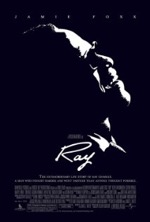
Starring: Jamie Foxx
October 2004
“Touching Tale Leaves Ray on Our Mind”
Ray Charles was one of the greatest singer/songwriters of our time. He was also a womanizer and a heroine addict. To its credit, Ray doesn’t gloss over these sordid details but exposes them for what they were…every star has foibles.
The movie begins with Ray getting on a bus and heading out to join a band in Seattle. As his career progresses, so does his back-story, which is revealed a chapter at a time in dreamy flashback sequences.
Reared in veritable poverty—in a sweltering Florida slum—Ray Charles had a fairly happy childhood playing games with his kid brother and terrorizing his hardworking mother. One day, Ray’s brother, while playing near a brimming washtub, slipped and drowned. Ray could have prevented the tragedy, but he just stood there, completely frozen in the oppressive heat. He blamed himself for decades after the incident, and his guilt created the pattern of self-destructive behavior that plagued him for most of his adult life.
Another retrospective segment reveals the time when Ray’s vision began to worsen. One of the most powerful scenes in the movie depicts the agony his mother endured as she resisted the urge to help Ray navigate around the various obstacles in their house. His mother instilled in Ray a dogged resolve, warning him that no one would pity him because of his handicap and that he needed to stand on his own two feet.
Ray took those words to heart by accepting small-time gigs and eventually working his way up to touring with a band and finally becoming a solo artist. Ray’s business sense served him in good stead (he required payment in dollar bills), as did his ability to negotiate (he once charmed his way into retaining his masters).
The story is a tragedy, but also a triumph; and after enduring a tumultuous season in rehab., Ray never went back to drugs. Also, he was honored by the state that had previously banned him when that state adopted “Georgia on My Mind” as its state song.
Jamie Foxx’s portrayal of Ray Charles is simply astounding; he comes as close as anyone ever has as to perfectly capturing the nuances and soul of the real-life person they’re playing. An Oscar nod for Foxx is a foregone conclusion—his performance is a revelation of Herculean proportions (and I don’t suppose it hurt that Foxx had the opportunity to meet and study the music legend before his untimely passing earlier this year).
Regina King, who plays Ray’s feisty paramour, excels as a triple-threat fly girl; she stands out as the only supporting character that holds her own against Foxx’s overpowering performance.
Ray is an emotional journey that takes the high road of veracity in a market replete with embellished versions of “true stories.” We miss you already, Ray.
Rating: 3
The Fighting Temptations (PG-13)
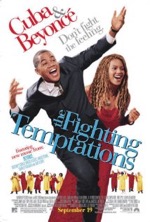
Starring: Cuba Gooding, Jr.
September 2003
“A Class Act, But No Sister Act”
Darrin Fox (Cuba Gooding, Jr.) is a fast talker who manages to work his way up the ladder to an enviable position at a marketing firm in New York City. Just when things are going great in his life, Darrin receives news that his beloved aunt has passed away. Returning to his hometown of Montecarlo, GA—the quintessential southern burg—Darrin is reunited with friends and family, whose speech, clothing and habits throw him into immediate culture shock; his roots have come back to haunt him.
Darrin stands to gain a great deal of money from his aunt’s will, but her dying wish contains one condition—Darrin must conduct the Baptist choir and win the annual music contest in order to receive his inheritance. Darrin, who knows next to nothing about music (but can fake his way through anything), is dealt a bad hand from the start; the choir contains half a dozen average vocalists, a wizened organ player and a controlling pastor’s wife who resists him at every turn.
Darrin enlists the help of his childhood sweetheart, Lilly (Beyonce Knowles), who has the voice of an angel, but according to the pastor’s wife, sings the devil’s music in the local bar. This is just the first of many obstacles Darrin must hurdle in order to build a choir and get it ready for the competition. When circumstances go from bad to worse, Darrin tucks tail and heads back to his comfortable life in the Big Apple. But he soon realizes it’s not about the money anymore; it’s about the relationships he’s built with his choir and the commitment he made to them and his departed aunt. Darrin returns with a newfound passion and leads his group in a rousing number at the competition. If you’ve seen Sister Act, you can guess the end from here.
And speaking of Sister Act, there are more than just a few similarities between that breakout blockbuster and The Fighting Temptations, but this new version of the “average church choir wins the big music competition” plot doesn’t hold a hymnal to the Whoopi Goldberg comedy classic. Cuba Gooding Jr. is believable in the way he gradually comes around, leaving behind his big city attitude and reverting to the caring and honest person he was in his youth. Beyonce Knowles hits her marks and says her lines, but it’s clear that her incredible voice is the only reason she’s in the movie.
There are some wonderful cameos in the film: Steve Harvey’s radio D.J. provides several moments of hilarity and the Rev. Shirley Caesar and rapper T-Bone lend their talents to the final show-stopping number. And let’s not forget the men in the orange jumpsuits—the inmates that Darrin recruits for his makeshift choir. Some of the movie’s funniest moments involve these upstanding (though cuffed) choir members.
The Fighting Temptations isn’t the greatest movie of its kind, but it is inspiring and features some toe tapping, head-bobbing and smile-raising Gospel music.
Rating: 2 1/2